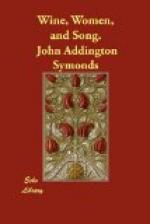Among drinking-songs of the best period in this literature may be reckoned two disputations between water and wine. In the one, Thetis defends herself against Lyaeus, and the poet assists in vision at their contest. The scene is appropriately laid in the third sphere, the pleasant heaven of Venus. The other, which on the whole appears to me preferable, and which I have therefore chosen for translation, begins and ends with the sound axiom that water and wine ought never to be mixed. It is manifest that the poet reserves the honour of the day for wine, though his arguments are fair to both sides. The final point, which breaks the case of water down and determines her utter confusion, is curious, since it shows that people in the Middle Ages were fully alive to the perils of sewage-contaminated wells.
THE CONTEST OF WINE AND WATER.
No. 51.
Laying truth bare, stripped
of fable,
Briefly as I may be able,
With good reasons
manifold,
I will tell why man should
never
Copulate, but rather sever,
Things that strife
and hatred hold.
When one cup in fell confusion
Wine with water blends, the
fusion,
Call it by what
name you will,
Is no blessing, nor deserveth
Any praise, but rather serveth
For the emblem
of all ill.
Wine perceives the water present,
And with pain exclaims, “What
peasant
Dared to mingle
thee with me?
Rise, go forth, get out, and
leave me!
In the same place, here to
grieve me,
Thou hast no just
claim to be.
“Vile and shameless
in thy going,
Into cracks thou still art
flowing,
That in foul holes
thou mayst lie;
O’er the earth thou
ought’st to wander,
On the earth thy liquor squander,
And at length
in anguish die.
“How canst thou adorn
a table?
No one sings or tells a fable
In thy presence
dull and drear;
But the guest who erst was
jolly,
Laughing, joking, bent on
folly,
Silent sits when
thou art near.
“Should one drink of
thee to fulness,
Sound before, he takes an
illness;
All his bowels
thou dost stir;
Booms the belly, wind ariseth,
Which, enclosed and pent,
surpriseth
With a thousand
sighs the ear.
“When the stomach’s
so inflated,
Blasts are then ejaculated
From both draughts
with divers sound;
And that organ thus affected,
All the air is soon infected
By the poison
breathed around.”
Water thus wine’s home-thrust
warded:
“All thy life is foul
and sordid,
Sunk in misery,
steeped in vice;
Those who drink thee lose
their morals,
Waste their time in sloth
and quarrels,
Rolling down sin’s
precipice.




